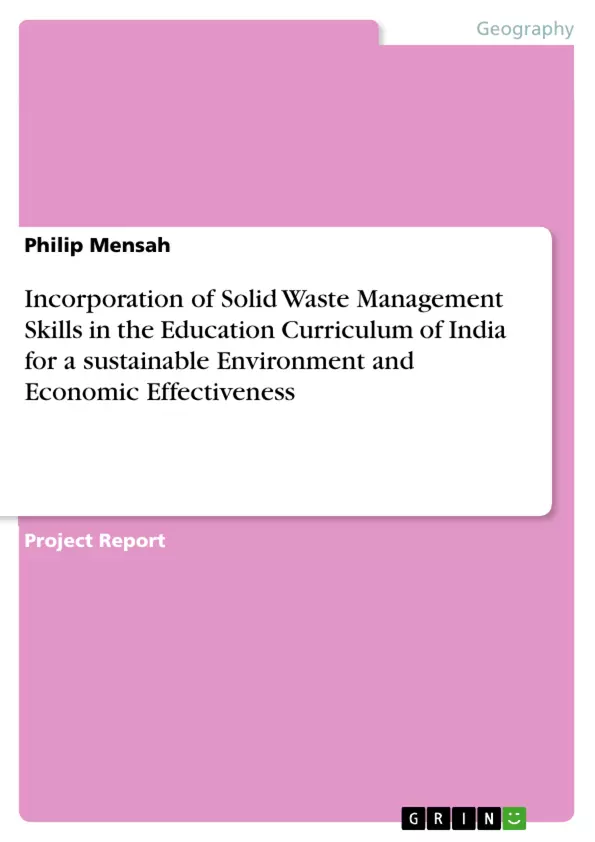Education of the people globally is expected to help solve societal and environmental problems, improve, and manage way of life. However, solid waste management has become a challenge in many countries not excluding India despite intensive education. Solid waste in India has been considered as low priority and is causing unsustainable environment. A well designed education curriculum for the people can help best manage solid waste even though it is unavoidable. This study seeks to incorporate the lapses of solid waste management skills: handling, collecting, disposing, storage, transporting, recycling, dumping etc. in the Secondary and senior Secondary education curriculum of India as compulsory and suggest to the stakeholders’ most appropriate solid waste management skills to be provided by the Secondary and senior Secondary curriculum of India.
At the Secondary level curriculum, these skills are missing from Social Science syllabus and not well detail in the Environmental Science of the Senior Secondary level curriculum. In all the population selected for the eight towns, Forty interviews will be conducted in each of the towns and eight hundred questionnaires will be issued out using random sampling technique. One hundred questionnaires will be administered to the respondents in each of the towns: Goraya and Philour of Jalandhar District, Khaira and Samrala of Ludhiana District, Phagwara and Sultanpru of Kapurthala, and Shahid Bhagat Singh, all in the Punjab State; students, teachers, workers of waste management organizations, and education experts. Much is happening internationally to promote environmental education.
The scares resources, vast increasing population, rapid urbanization, and increasing global industrialization have called for protection of the environment through education. Environmental education can be defined as “process of providing learning experiences to obtain knowledge, understanding, skills, and awareness with desirable attitudinal changes about man’s relationship with his natural and man-made surroundings”. Protection of public health and environment from bad condition must be responsibility of everyone because it enhances reduction or elimination of adverse negative impacts on the environment and human health, supports economic development and improved quality of life.
Inhaltsverzeichnis (Table of Contents)
- INTRODUCTION.
- REVIEW OF LITERATURE.
- PROPOSED RESEARCH METHODOLOGY.
- REFERENCE.
- Appendix I
- Appendix II
- Background of the study
Zielsetzung und Themenschwerpunkte (Objectives and Key Themes)
This study aims to analyze the lack of solid waste management skills in the Secondary and Senior Secondary education curriculum of India and suggest appropriate skills to be incorporated into the curriculum. The study explores the challenges posed by solid waste management in India, highlighting the need for a comprehensive approach to addressing this issue.
- The Importance of Environmental Education in Solid Waste Management
- The Current State of Solid Waste Management in India
- The Role of Education in Promoting Sustainable Waste Management Practices
- The Need for a Comprehensive Curriculum that Incorporates Solid Waste Management Skills
Zusammenfassung der Kapitel (Chapter Summaries)
- INTRODUCTION: This section provides a comprehensive overview of the study's background, outlining the challenges posed by solid waste management in India. It discusses the importance of environmental education in promoting sustainable waste management practices, emphasizing the need for a more comprehensive curriculum that addresses solid waste management skills.
- REVIEW OF LITERATURE: This chapter explores existing research on solid waste management, focusing on the various aspects of waste generation, collection, disposal, and recycling in India. It analyzes current practices, highlighting the need for improved waste management strategies.
- PROPOSED RESEARCH METHODOLOGY: This section outlines the study's proposed research methodology, including data collection methods, sampling techniques, and data analysis procedures. It provides a detailed description of the study's research design and its intended scope.
Schlüsselwörter (Keywords)
This study focuses on the key topics of solid waste management, education curriculum, sustainable environment, and economic effectiveness in India. It explores the relationship between these concepts and how they can be leveraged to develop effective waste management solutions.
Frequently Asked Questions
What is the main objective of this study on solid waste management in India?
The study aims to analyze the lack of solid waste management skills in India's secondary education curriculum and suggest appropriate skills for incorporation.
Why is environmental education important for waste management?
It provides the knowledge, skills, and awareness necessary to change attitudes toward man's relationship with the environment and public health.
Which specific waste management skills are missing from the current curriculum?
Skills such as handling, collecting, disposing, storage, transporting, and recycling are often missing or not detailed enough in social and environmental science syllabi.
In which regions of India was the research conducted?
The study focuses on several towns in the Punjab State, including Goraya, Philour, Khaira, Samrala, Phagwara, and Sultanpur.
Who was interviewed for the data collection?
The respondents included students, teachers, waste management workers, and education experts.
- Citation du texte
- M.Tech.Ed (Construction Technology) Philip Mensah (Auteur), 2018, Incorporation of Solid Waste Management Skills in the Education Curriculum of India for a sustainable Environment and Economic Effectiveness, Munich, GRIN Verlag, https://www.grin.com/document/440897



